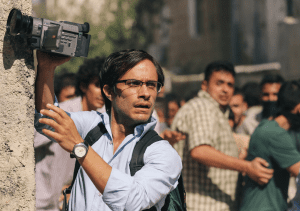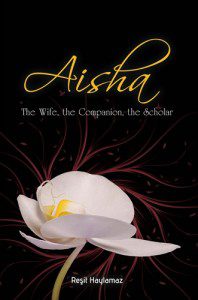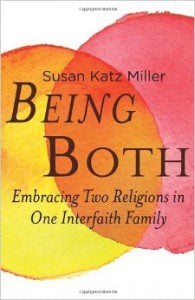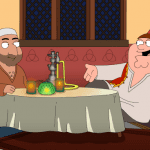 |
|
Jew, me?
|
The portrayal of Muslims in film has often been mired in stereotypes, and a film called The Infidel may not seem a good place to start breaking them down. But in a world where new Muslim stereotypes include fiery underwear and rage against teddy bears, perhaps a new perspective is just what we need. Enter the new comedy by British writer David Baddiel and starring British-Iranian comedian Omid Djilali, which manages to find someplace human and universal despite gorging on many of those same stereotypes and adding in every possible Jewish one for good measure.
The film’s opening premise is actually a clever one – mildly religious Muslim family man Mahmoud Nasir (Djilali) discovers he was born Jewish before being adopted by a Muslim family. Having clashed with his Jewish-American cabbie neighbour, Lenny (The West Wing’s Richard Schiff), he reluctantly turns to him to make sense of his new predicament.
Mahmoud, who recently lost his last surviving parent, discovers that his birth father is dying in a Jewish nursing home and is barred from visiting lest the news of his long-lost Muslim son finishes him off. And so begins a crash course of bar mitzvahs, kvetching, and Woody Allen-esque self-deprecation.
On the Muslim side, Mahmoud’s aborted attempts to relay this news to his imam and his patient wife Saamiya (The Good Wife’s Archie Panjabi) leaves both thinking Mahmoud is secretly gay. Finally, Mahmoud’s son Rashid (Amit Shah) is courting the daughter of fundamentalist cleric Arshad Al-Masri (Igal Naor), whom Mahmoud must impress by emphasizing his Muslim-ness.
Mahmoud, of course, is none of these things, but rather a middle-aged Muslim everyman, a “Muslim Homer Simpson,” as Djalili described to me. He is someone who is aware of his imperfections (coarse language is certainly one of them), but still identifies as a Muslim and will stand up for his identity when push comes to shove, much like the rest of us.
Finding its arc through this cultural minefield, we see more conventional cultural wisdom turned on its head. Dancing niqabis, kids playing muhajideen and kafirs, hook-handed clerics dunking biscuits in their tea, and a washed-up New Romantic with anger management issues. With so much innuendo and cliché flying all over the place, it takes a rather absurd turn of events at the end to bring things back to earth. But you’ll be too busy laughing to care at that point. The Infidel is an enormously funny movie.
Ultimately, this film would struggle to make its point if it weren’t for Djilali’s easy charm and physical humour (Baddiel has said that in Djalili’s absence, he would only have himself to play the part as a distant second). Djilali is a revelation here, expressing much of his role with understatement and good timing. It doesn’t hurt that his appearance is neutrally Semitic, passing easily for a Muslim or Jew. It is Djilali’s terrific performance that, by the end, helps Mahmoud find a happy place.
It was also important that the prototypical Muslim family be viewed as culturally secure and accessible. Uzma Hasan, one of the producers, also saw to it that Rashid was a mild-mannered moderate and not the angry young Muslim often seen elsewhere. Saamiya’s role is confident, but not shrill. The conflict between Israel and Palestine – the “elephant in the room,” according to Baddiel – is discussed twice in the movie and in a way that doesn’t throw the main narrative off track. “All of these issues like Israel/Palestine can get so vitriolic,” says Hasan. “If you can laugh, you can see the human aspects and not see it as big religions against each other.”
Also notable is that there are virtually no characters in the film that are not Muslim or Jewish, leaving out the minority to majority narrative common to other ethnic comedies like My Big Fat Greek Wedding. “This film says that Muslims and Jews are just part of Britain,” says Baddiel. “So there’s no need to [ask] how they fit in with wider culture. They just are Britain and they talk to each other.”
Is The Infidel the cinematic heir to British culture clash comedies such as East is East and Bend it like Beckham? Probably not. Baddiel’s everything-and-the-kitchen-sink approach ultimately leaves viewers a bit overwhelmed and the ensemble cast here doesn’t approach the breadth of engagement found in those earlier examples. That isn’t due to any serious faults with the cast, but rather with the appeal and magnetism of Djilali’s performance. This is basically a one-man show.
An East London screening on Tuesday to a Muslim audience was warmly received (with some concerns about language) and Baddiel has no fears of a backlash. Unlike the forthcoming satirical film Four Lions by fellow British comedian Chris Morris (which satirizes homegrown British suicide bombers), The Infidel plays as a rather conventional buddy movie that pokes fun at cultural differences, rather than religious ones.
Still, this film was born despite a prejudice that Muslims would find something in it to be offended. And yet, as of the film’s premiere in the UK today, distributors have been found in 62 countries, including Lebanon, Iran, and Saudi Arabia – all countries with notorious censorship restrictions. The notable omission is Israel, where fears of offending some sections of Jewish society have kept it off the table.
If that’s not the reaction you might have expected, consider it one more stereotype about Muslims that The Infidel has managed to successfully neutralize.
The Infidel premieres today in cinemas throughout Britain. It debuts in the US at the Tribeca Film Festival in New York City on April 25th.
Zahed Amanullah is Executive Editor of altmuslim.com











